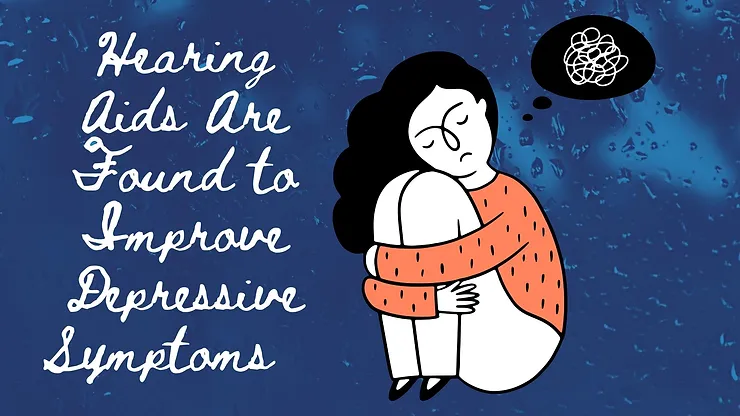
Hearing loss not only impacts hearing ability but also mental health. Impaired hearing makes it difficult to absorb and process sound, producing a range of symptoms that present various challenges to navigating daily life. This includes straining communication which can dramatically impact the quality of conversations and social interactions. Experiencing this chronically takes a toll on various aspects of life and can lead to other adverse health outcomes including depressive symptoms. Fortunately, hearing loss can be effectively treated, most commonly with hearing aids. Hearing aids maximize hearing and alleviate hearing loss symptoms.
Link Between Hearing Loss & Depression
Several studies show a link between hearing loss and depressive symptoms. This includes a 2014 study conducted by the National Institute on Deafness & Other Communication Disorders where researchers evaluated the correlation between hearing loss and depression. The study involved analyzing data from a national survey which included information about both depression and hearing loss. Data was collected for 18,318 people, ages 18 and older. Researchers found that moderate to severe depression was:
-
4.9% for people with excellent hearing
-
11.4% for people with little to severe hearing loss
These findings highlight that depression was more than twice as likely for people with hearing loss; revealing a significant correlation. Hearing loss has far reaching effects on daily life and its impact can profoundly affect wellness.
Impact of Hearing Loss
Hearing loss is the third most common chronic medical condition that people navigate today. Caused by various factors – existing medical conditions, exposure to loud noise, aging, head injuries, genetic history etc. – hearing loss results in numerous symptoms that can significantly impact daily life. This includes:
-
Tinnitus: a ringing, buzzing, clicking like noise in one or both ears
-
Sounds are muffled, make it hard to identify words and hear clearly
-
Needing to increase the volume on electronic devices
-
Frequently asking others to speak loudly, slowly, and/or repeat themselves
-
Difficulty hearing in environments with background noise
These symptoms can be mild to severe, creating barriers for effective communication. Following conversations can be tough and people can feel confused or stressed. People with untreated hearing loss often try to use different strategies to help hearing like reading lips, pretending to hear, using nonverbal cues etc. which can be exhausting and ineffective. This is frustrating for everyone involved and conversations can simply feel like too much work. Strained communication can lead to avoiding conversations altogether, meaning spending less time with others and skipping out on social activities. Social withdrawal impacts mental health in a variety of ways: isolation, contributing to anxiety, loneliness, and depression. The best way to address and alleviate these symptoms is by treating hearing loss.
Hearing Aids Improve Depressive Symptoms
Though hearing loss is a permanent condition, there are effective ways that it is managed. The most common treatment is hearing aids which are electronic devices that are designed to absorb, amplify, and process sound. This maximizes hearing ability which has countless benefits including strengthening communication, social life, and enhanced interpersonal relationships. This alleviates depressive symptoms by restoring confidence, independence, happiness etc. improving mental health. Studies have highlighted these benefits, showing the positive impact of hearing aids. This includes a study published in 2016 that was conducted by researchers at Johns Hopkins School of Medicine. The study included 113 participants, ages 50 and older, who newly received hearing aids or cochlear implants. These participants were observed for one year which allowed researchers to assess the impact of hearing aids on their life. Researchers found that depressive symptoms decreased by:
-
For hearing aid users:
-
28% after 6 months
-
16% after 12 months
-
For people with cochlear implant:
-
31% after 6 months
-
38% after 12 months
These statistics show that hearing aids significantly reduced depressive symptoms within one year of use. Treating hearing loss is key to improving the quality of daily life. The first step in addressing impaired hearing is to schedule an appointment for a hearing test. Hearing tests involve a painless process that measures hearing capacity in both ears which identifies any impairment and the degree. This establishes your specific hearing needs and the most effective treatment to meet those needs!
If you are ready to schedule a hearing test, we’re here to help! Contact us today.
